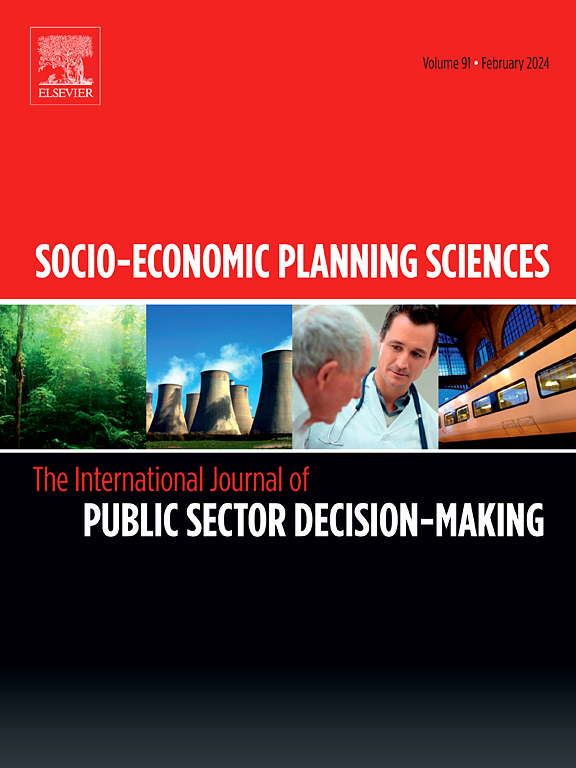Sustainable food waste supply chain network design problem with government environmental oversight: Globalized robust bi-level model and exact algorithm
IF 5.4
2区 经济学
Q1 ECONOMICS
引用次数: 0
Abstract
In the context of circular economy, governments and stakeholders are increasingly concerned about the sustainable development of food waste utilization. Due to the social value and economic significance of food waste recovery system, an examination is conducted on a sustainable food waste supply chain (SFWSC) with government environmental oversight. Under the uncertain amount of food waste collected daily, a novel globalized robust bi-level programming model with government oversight is proposed to optimize the reuse of food waste to minimize total costs and negative environmental impacts such as CO2 and CH4. The characterization of the uncertainty of food waste involves a pair of inner and outer uncertainty sets. Based on strong duality theory, the globalized robust bi-level optimization model can be transformed into a computationally tractable mixed integer programming model. To improve solution efficiency and quality, this paper employs the Benders decomposition (BD) algorithm with two accelerated strategies to solve the equivalent model. Lastly, a large-scale case study of food waste management in Shandong Province, China, is carried out to showcase the applicability of the proposed model and algorithm. The results indicate that food waste companies can reduce total costs without increasing environmental impacts under government environmental oversight.
政府环境监督下的可持续食物垃圾供应链网络设计问题:全球化鲁棒双级模型和精确算法
在循环经济背景下,各国政府和利益相关者越来越关注食物垃圾利用的可持续发展问题。鉴于食物垃圾回收系统的社会价值和经济意义,本文对政府环境监督下的可持续食物垃圾供应链(SFWSC)进行了研究。在每天收集的食物垃圾数量不确定的情况下,提出了一种具有政府监督的全球化鲁棒双层规划模型,以优化食物垃圾的再利用,从而最大限度地降低总成本和对环境的负面影响,如CO2和CH4。食物浪费不确定性的表征涉及一对内部和外部不确定性集。基于强对偶理论,将全球化鲁棒双级优化模型转化为计算可处理的混合整数规划模型。为了提高求解效率和质量,本文采用Benders分解(BD)算法和两种加速策略求解等效模型。最后,以山东省食物垃圾管理为例,对所提模型和算法的适用性进行了验证。结果表明,在政府环境监管下,食品垃圾企业可以在不增加环境影响的情况下降低总成本。
本文章由计算机程序翻译,如有差异,请以英文原文为准。
求助全文
约1分钟内获得全文
求助全文
来源期刊

Socio-economic Planning Sciences
OPERATIONS RESEARCH & MANAGEMENT SCIENCE-
CiteScore
9.40
自引率
13.10%
发文量
294
审稿时长
58 days
期刊介绍:
Studies directed toward the more effective utilization of existing resources, e.g. mathematical programming models of health care delivery systems with relevance to more effective program design; systems analysis of fire outbreaks and its relevance to the location of fire stations; statistical analysis of the efficiency of a developing country economy or industry.
Studies relating to the interaction of various segments of society and technology, e.g. the effects of government health policies on the utilization and design of hospital facilities; the relationship between housing density and the demands on public transportation or other service facilities: patterns and implications of urban development and air or water pollution.
Studies devoted to the anticipations of and response to future needs for social, health and other human services, e.g. the relationship between industrial growth and the development of educational resources in affected areas; investigation of future demands for material and child health resources in a developing country; design of effective recycling in an urban setting.
 求助内容:
求助内容: 应助结果提醒方式:
应助结果提醒方式:


